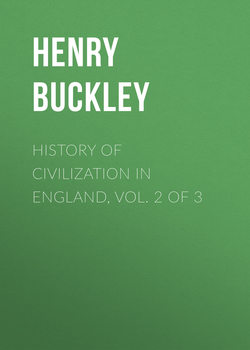History of Civilization in England, Vol. 2 of 3

Реклама. ООО «ЛитРес», ИНН: 7719571260.
Оглавление
Henry Buckley. History of Civilization in England, Vol. 2 of 3
CHAPTER I. OUTLINE OF THE HISTORY OF THE FRENCH INTELLECT FROM THE MIDDLE OF THE SIXTEENTH CENTURY TO THE ACCESSION TO POWER OF LOUIS XIV
CHAPTER II. HISTORY OF THE PROTECTIVE SPIRIT, AND COMPARISON OF IT IN FRANCE AND ENGLAND
CHAPTER III. THE ENERGY OF THE PROTECTIVE SPIRIT IN FRANCE EXPLAINS THE FAILURE OF THE FRONDE. COMPARISON BETWEEN THE FRONDE AND THE CONTEMPORARY ENGLISH REBELLION
CHAPTER IV. THE PROTECTIVE SPIRIT CARRIED BY LOUIS XIV. INTO LITERATURE. EXAMINATION OF THE CONSEQUENCES OF THIS ALLIANCE BETWEEN THE INTELLECTUAL CLASSES AND THE GOVERNING CLASSES
CHAPTER V. DEATH OF LOUIS XIV. REACTION AGAINST THE PROTECTIVE SPIRIT, AND PREPARATIONS FOR THE FRENCH REVOLUTION
CHAPTER VI. STATE OF HISTORICAL LITERATURE IN FRANCE FROM THE END OF THE SIXTEENTH TO THE END OF THE EIGHTEENTH CENTURY
CHAPTER VII. PROXIMATE CAUSES OF THE FRENCH REVOLUTION AFTER THE MIDDLE OF THE EIGHTEENTH CENTURY
CHAPTER VIII. OUTLINE OF THE HISTORY OF THE SPANISH INTELLECT FROM THE FIFTH TO THE MIDDLE OF THE NINETEENTH CENTURY
Отрывок из книги
When, towards the end of the fifth century, the Roman empire was broken up, there followed, as is well known, a long period of ignorance and of crime, in which even the ablest minds were immersed in the grossest superstitions. During these, which are rightly called the Dark Ages, the clergy were supreme: they ruled the consciences of the most despotic sovereigns, and they were respected as men of vast learning, because they alone were able to read and write; because they were the sole depositaries of those idle conceits of which European science then consisted; and because they preserved the legends of the saints and the lives of the fathers, from which, as it was believed, the teachings of divine wisdom might easily be gathered.
Such was the degradation of the European intellect for about five hundred years, during which the credulity of men reached a height unparalleled in the annals of ignorance. But at length the human reason, that divine spark which even the most corrupt society is unable to extinguish, began to display its power, and disperse the mists by which it was surrounded. Various circumstances, which it would be tedious here to discuss, caused this dispersion to take place at different times in different countries. However, speaking generally, we may say that it occurred in the tenth and eleventh centuries, and that by the twelfth century there was no nation now called civilized, upon whom the light had not begun to dawn.
.....
In the eleventh century there arose the celebrated institution of chivalry,325 which was to manners what feudalism was to politics. This connexion is clear, not only from the testimony of contemporaries, but also from two general considerations. In the first place, chivalry was so highly aristocratic, that no one could even receive knighthood unless he were of noble birth;326 and the preliminary education which was held to be necessary was carried on either in schools appointed by the nobles, or else in their own baronial castles.327 In the second place, it was essentially a protective, and not at all a reforming institution. It was contrived with a view to remedy certain oppressions as they successively arose; opposed in this respect to the reforming spirit, which, being remedial rather than palliative, strikes at the root of an evil by humbling the class from which the evil proceeds, passing over individual cases in order to direct its attention to general causes. But chivalry, so far from doing this, was in fact a fusion of the aristocratic and the ecclesiastical forms of the protective spirit.328 For, by introducing among the nobles the principle of knighthood, which, being personal, could never be bequeathed, it presented a point at which the ecclesiastical doctrine of celibacy could coalesce with the aristocratic doctrine of hereditary descent.329 Out of this coalition sprung results of great moment. It is to this that Europe owes those orders, half aristocratic half religious,330 the Knights Templars, the Knights of St. James, the Knights of St. John, the Knights of St. Michael: establishments which inflicted the greatest evils on society; and whose members, combining analogous vices, enlivened the superstition of monks with the debauchery of soldiers. As a natural consequence, an immense number of noble knights were solemnly pledged to ‘defend the church;’ an ominous expression, the meaning of which is too well known to the readers of ecclesiastical history.331 Thus it was that chivalry, uniting the hostile principles of celibacy and noble birth, became the incarnation of the spirit of the two classes to which those principles belonged. Whatever benefit, therefore, this institution may have conferred upon manners,332 there can be no doubt that it actively contributed to keep men in a state of pupilage, and stopped the march of society by prolonging the term of its infancy.333
On this account, it is evident that, whether we look at the immediate or at the remote tendency of chivalry, its strength and duration become a measure of the predominance of the protective spirit. If, with this view, we compare France and England, we shall find fresh proof of the early divergence of those countries. Tournaments, the first open expression of chivalry, are of French origin.334 The greatest and, indeed, the only two great describers of chivalry are Joinville and Froissart, both of whom were Frenchmen. Bayard, that famous chevalier, who is always considered as the last representative of chivalry, was a Frenchman, and was killed when fighting for Francis I. Nor was it until nearly forty years after his death that tournaments were finally abolished in France, the last one having been held in 1560.335
.....